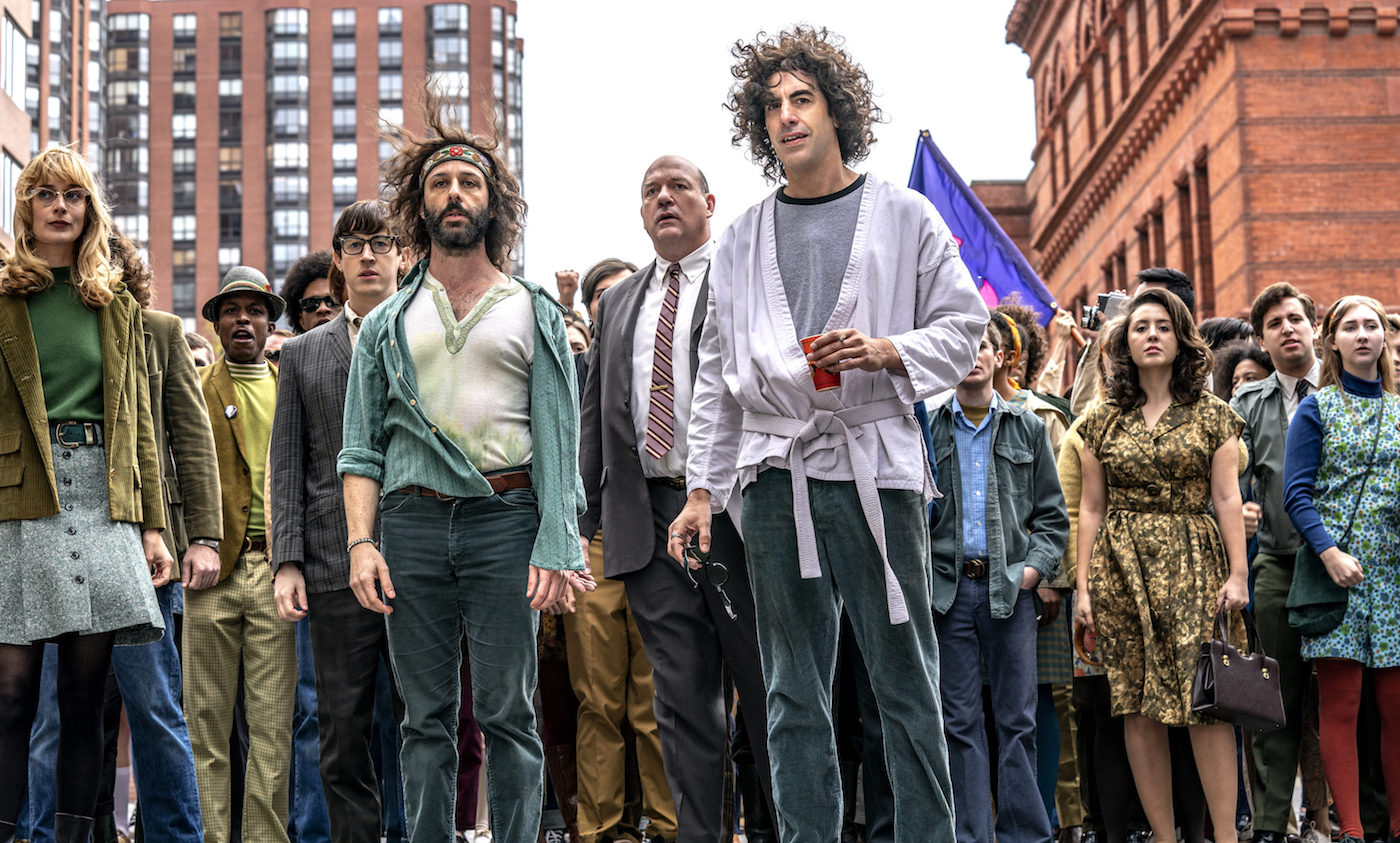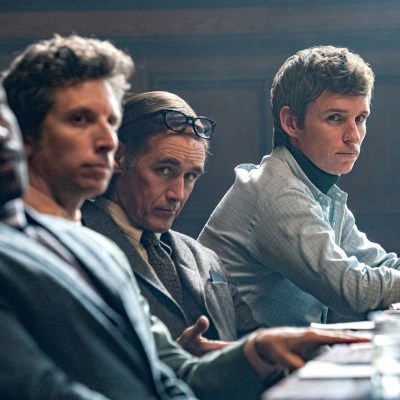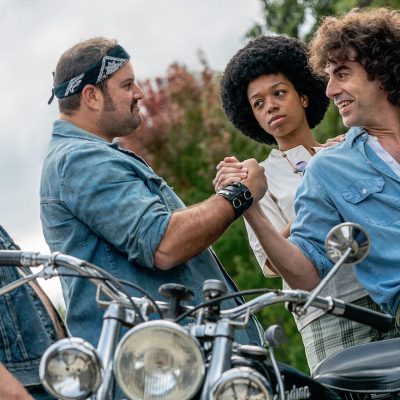“You don’t need a weatherman to know which way the wind blows,” Bob Dylan intoned on his song “Subterranean Homesick Blues,” influencing a group of young mad bombers to blow against the wind. The group at the center of Aaron Sorkin’s The Trial of the Chicago 7 didn’t blow up bathrooms in federal investigative agencies; they protested bombings, and all other forms of violence, when they stood against authority at the Democratic National Convention in 1968.
The Youth International Party, or Yippies, was non-violent, even if one of the co-founders, Abbie Hoffman (played by Sacha Baron Cohen in the movie), wrote his first radical tract, Fuck the System, under the pseudonym George Metesky, a mad bomber from the 1940s. The other, Jerry Rubin (Jeremy Strong on screen), blew bubbles while dressed as George Washington at his HUAC hearing.
Rubin would go on to beat bongos as part of John Lennon’s morphing street musician crusaders, playing live at political demonstrations across America, while Hoffman was knocked upside the head with the guitar of The Who’s Pete Townshend when he interrupted the band at Woodstock. But Lennon had the last word about Rubin. “I gotta ask you comrades and brothers, how do you treat your own woman back home?” Lennon asked in the song “Power to the People.” He was singing to Rubin.
Abbie Hoffman was a radical. He believed in the redistribution of wealth and power, universal hospital care, and that the richest country in the world should not have homeless people. Radical, said his political enemies. Insane. Crazy like the Flower Power movement he was part of. Flowers don’t power things, oil does. Money does. Blood does.
Hoffman’s contribution to political literature was a guidebook on living free, and the first step was to take the title literally: Steal This Book. By the time Hoffman resurfaced from his years underground as a drug dealing charged fugitive, he expressed his primary concern, and that of many caught up in the insane no-tolerance drug policies of the time, with the book Steal This Urine Test. It didn’t suggest dumping them in the holy water. It waged guerilla warfare on the War on Drugs.
Hoffman was a born outlaw, a duck-tailed, leather jacketed teen rebel looking for a cause. Born Nov. 30, 1936 in Worcester, Massachusetts, he was expelled from Classical High School when a paper he wrote concluded God could not possibly exist, prompting his teacher to call him a Communist punk. Hoffman proved it by jumping the teacher.
Rubin was born July 14, 1938 in Cincinnati. His father was a union organizer. Rubin was one of the leaders of the 1967 anti-war march on the Pentagon. After the heyday of the protest movement, Rubin moved from radical politics to freeing the mind with human potential, although it wasn’t free of charge.
Rubin was a burgeoning businessman, but was also an outlaw at heart. He even died breaking a law. One of the most basic laws almost everyone, regardless of class, color, or creed, thinks nothing of breaking. Rubin died of a heart attack two weeks after being hit by a car while jaywalking. The implications seem almost surreal, but the Yippie movement was filled with ridiculous ways to challenge legal authority.
Well before Rubin’s death in the ‘90s, he was there with Hoffman on Aug. 24, 1967, tossing fistfuls of dollars, real and fake, on the floor of the New York Stock Exchange to protest capitalism. Traders went crazy grabbing at the cash. The NYSE built a wall to stop the unfettered financial fun. The Youth International Party nominated Pigasus, a pig, as its candidate for president in the 1968 election campaign.
The “Chicago Seven” trial, named after Bobby Seale of the Black Panthers was tried separately from the original defendants, was loaded with courthouse street theater. They even wanted to design their own costumes. The first things Rubin, Hoffman, Rennie Davis, David Dellinger, John Froines, Tom Hayden, and Lee Weiner did when they went into trial was to stomp on their judicial robes. When Hoffman got sworn in as a witness, his hand was giving the finger.
The defendants were charged with conspiracy to incite a riot, but they were a riot in court. Sadly, the judge at the bench didn’t get the jokes. Judge Julius Hoffman’s humor went another way. He thought it was fitting to have Seale bound and gagged when he wanted to be tried separately, and didn’t like to be heckled. The giddy group of mischievous militants were cited for contempt over 200 times.
The Chicago Seven Trial saw the appearances of “cultural witnesses” like Allen Ginsberg, Phil Ochs, Arlo Guthrie, and Norman Mailer. Hoffman gave a speech saying if Abraham Lincoln were alive and in Chicago during the convention, he would have been arrested in Lincoln Park. When he was being sentenced, Hoffman offered to hook the judge up with an LSD dealer he knew.The U.S. 7th Circuit Court of Appeals overturned the Chicago Seven convictions, cited errors by Judge Hoffman and criticized his courtroom demeanor. The Walker Commission, which investigated the disruption at the Chicago Democratic Convention, concluded it was a “police riot.”
The old guard Left was also lacking in its sense of humor. The militant youth movement, hippies, self-proclaimed freaks and Free Speech movers, were merry pranksters. Diehard socialists fought with placards, bricks, and feet. Hoffman tried to levitate the Pentagon. Was it childish? The demonstration would have heard noted baby-rearing author Dr. Benjamin Spock speak about the importance of protecting children of any age. The protesters were met by soldiers of the 82nd Airborne Division. With poet Allen Ginsberg leading Tibetan chants behind him, Hoffman telepathically tuned in and declared the Vietnam War would end when the Pentagon started to vibrate and turn orange.
The Youth International Party had no official membership or leadership. Before the Yippie movement, Rubin ran as the radical candidate for mayor of Berkeley, on a platform of exposing his opponent’s racist hiring policies. Hoffman was involved with the Student Nonviolent Coordinating Committee (SNCC) and a radical community-action group called the Diggers, who kicked him out for being a media junky. Abbie published a book blowing “the hustle of every poor person on the Lower East Side,” according to Peter Coyote.
Following the trial, Rubin wrote the books Do It! and We Are Everywhere, which made him think he was a rock star. He appeared with Lennon, Yoko Ono, Bobby Seale, Ralph Nader, Chuck Berry, and George Carlin on The Mike Douglas Show. Until the end of his career, Douglas maintained that was the most interesting week of his entire career.
On Aug. 28, 1973, Hoffman was arrested in New York City for trying to sell $36,000 worth of cocaine. He said he was set up and entrapped. He jumped bail in 1974 and vanished, occasionally popping up to remind police he’d disappeared. Turns out he was actually working for the rock magazine Crawdaddy! as a travel writer under the name Barry Freed and had his face rendered unrecognizable by plastic surgery. He surrendered to authorities in 1980, but not until after he taped an interview with Barbara Walters for ABC’s 20/20. He received a one-year sentence but was released after four months.
In the late ‘70s, Rubin discovered seminar training with est and sold a nutritional drink called Wow, which had plenty of kelp, ginseng and bee pollen. Bobby Seale was one of his salesmen. Having broken down the $20,000 financial firewall constructed after the fistfuls-of-dollars stunt, Rubin returned to Wall Street in the 1980s decade of greed and trickle-down voodoo economics. At first, he claimed he was trying to bring some consciousness to the spiritual center of capitalism. But then he sold his soul for a three-piece suit and became a broker. He opened Business Networking Salons, Inc., hosting parties at Studio 54, and said he was part of a real American revolution. Rubin and Hoffman went on a speaking tour giving public debates about yuppies versus Yippies.
Read more
Rubin took to the “Me Generation” with the same fervor he had with the cultural revolution of the 1960s. He embarked on an inner revolution, eating carrots until he turned orange. He also atoned for his misogynist past by discussing his own sexual shortcomings in the 1980 book The War Between the Sheets, which he wrote with his wife, commodities futures trader Mimi Leonard.
Rubin could afford it, he had by this time become a multimillionaire, having invested in Apple Computer. Hoffman never bit the apple, continuing in the tradition of American civil disobedience whether it came to saving trees from deforestation or Third World Countries from the U.S. intelligence community. One embraced the unfettered financial social coup, the other was disgusted with the anti-capitalist complacency of Reagan America.
Hoffman made a cameo appearance playing himself in Oliver Stone’s Born on the Fourth of July, the story of anti-war activist Ron Kovic. Rubin would have been quite comfortable as himself in Stone’s Wall Street, the embodiment of the “Greed is Good” mentality.
Hoffman was arrested In November 1986, along with Amy Carter, the daughter of former President Jimmy Carter, for trespassing at the University of Massachusetts Amherst to protest CIA recruitment on its campus. The federal district trial which followed exposed CIA involvement in Nicaragua, along with decades of illegal covert activities.
Hoffman was found dead in his apartment, on April 12, 1989, in an apparent suicide. When Abbie died, Jerry was the only Chicago conspiracy defendant at the funeral. “I used to say, ‘Don’t trust anyone over 30,’” Rubin told a reporter in his financially fatter latter years. “Now I say don’t trust anyone under 50.” Abbie maintained the ideals of his youth, but found far fewer dividends.
The pair were happy to be the “clowns for peace” Lennon called himself during his and Yoko’s honeymoon protest. They brought the generational divide closer together by exposing the ridiculous nature of the divisions. Aaron Sorkin’s The Trial of the Chicago 7 sets out to capture all three rings of the circus of political justice. Rubin and Hoffman were masters of ceremonies in the most unceremonious of ways.


